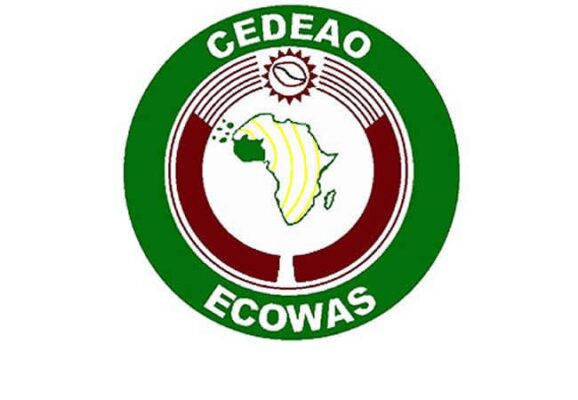The federal government has officially rolled out the ECOWAS National Biometric Identity Cards (ENBIC) to enhance ease of doing business, promote economic prosperity, and strengthen security across the sub-region.
The initiative, developed by the Nigeria Immigration Service (NIS), came into effect 11 years after its conception.
Six ECOWAS member countries have already implemented the project in line with regional protocols aimed at improving security and boosting economic growth.
The inauguration ceremony took place on Friday at the Transcorp Hotel, Abuja, and was attended by key officials including the representative of the Secretary to the Government of the Federation (SGF), the Minister of Interior, Dr Olubunmi Tunji-Ojo, the Comptroller-General of Immigration, Mrs Kemi Nanna Nandap, the Director General of the Department of State Services (DSS), Adeola O Ajayi, and the Director General of the National Intelligence Agency (NIA), Ambassador Mohammed Mohammed.
Others present were the Commandant General of the NSCDC, Prof. Ahmed Audi; Controller General of Corrections, Sylvester Nwakuche; and the representative of the Inspector General of Police, Kayode Egbetokun, AIG Victor Olaiya.
READ ALSO: ECOWAS Suspends Guinea-Bissau After Military Coup
Speaking at the event, SGF Dr George Akume, represented by the Permanent Secretary, Cabinet Office, Alhaji Mohammed Sanusi Danjuma, described the ECOWAS Card as “a powerful engine for regional transformation.”
The SGF noted that “Nigeria, despite its challenges, remained an unshakeable pillar for ECOWAS since its establishment in 1975,” adding that “the ECOWAS Card being inaugurated was a further testimony that Nigeria would continue to play its leadership roles within the sub-region.”
Dr Akume praised President Bola Tinubu, the Minister of Interior, Dr Tunji-Ojo, and the Comptroller-General of Immigration, Kemi Nandap, for accelerating the launch of the Cards, stating that the initiative “would unlock opportunities for businesses, promote regional trade, and ensure digital identity and authentication for citizens within the ECOWAS member countries.”
He emphasised that “Nigeria’s commitment towards regional integration and free movement of migrants within the region remained consistent and resolute,” adding that “the rollout of the ECOWAS Card is not the end of the journey, but a powerful new beginning.”
Read Also
Dr Akume also urged member states to ensure accessibility to the Cards, noting that “the success of the efforts also depended largely on partnership with the private sector to drive financial inclusion, and scale up business activities without jeopardising National security.”
The Minister of Interior, Dr Tunji-Ojo, described the launch as a landmark achievement, noting that it followed “11 years of the conception of the project by ECOWAS member countries.” He stated that it aligned with President Tinubu’s vision to transform the country and reinforce Nigeria’s leadership role within the sub-region and across Africa.
“The ECOWAS Card is the foundation for identity management and authentication. We have, by the deployment of this project, taken pressure off our Passport systems, and it will provide a foundation for the regional database. With these cards, you don’t need to travel within ECOWAS countries with Passports,” Tunji-Ojo said.
He further explained, “Migration data has to be made available so that we can synchronise and manage our migration systems in collaboration with others. Though I cannot discuss the details here, certainly, we cannot manage our migration system in isolation. However, we are glad that the deployment of this card would reinforce our resolve to boost economic activities within the region and enhance security.”
Tunji-Ojo added that alongside the inauguration of the Advanced Passenger Information System by the Immigration Service, “the Service would also launch the Single Travel Emergency Passports by January next year,” which would enable Nigerians abroad to return home seamlessly in case of lost passports, adding that “with the use of their telephones, Nigerians abroad can find their way home with the new documents.”
Comptroller-General of Immigration, Mrs Kemi Nandap, described the ECOWAS Card as “a landmark achievement in our collective pursuit of stronger regional integration and security.”
She noted that the card would facilitate “the free movement of persons, goods, services, and capital within the ECOWAS region,” while also contributing to “a secure, prosperous, and integrated region.”
Mrs Nandap praised President Tinubu for his “unwavering commitment to regional integration and security,” stating that “his decisive leadership has been central to advancing this initiative.”
She also commended the Minister of Interior for his support, noting that “The New Travel Biometric Card introduced today supports intra-regional mobility within ECOWAS countries. Featuring a secure biometric system, it will strengthen border management by accurately identifying travellers.”
She further explained that “The ENBIC aims to facilitate legal movement, promote tourism, investment, and trade, and support economic growth throughout the region. Furthermore, ENBIC will deliver tangible benefits, including: strengthened regional security and safer travel.”





